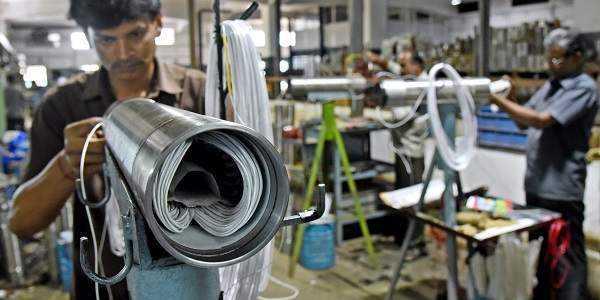Disaster of Demonetisation: Tamil Nadu Industries Struggle to Regain Shape

Image used for representational purpose. Image Courtesy: New Indian Express
Velusamy, a weaver from Tirupur has gloomy memories of demonetisation. “I used to weave for mass weavers for a fixed coolie [wages]. After demonetisation, I did not get any work. My coolie for the completed work was reduced all of a sudden. This activity pushed us into steep debt,” he said.
“The wage revision for weaving has been pending for the past seven years. The industry is slowly getting killed because of the ignorant government. If this continues, the entire industry will be shut down, and everyone will have to look for some other job,” added Velusamy.
This simply explains the impact of the demonetisation on the country. The objectives proclaimed by the Prime Minister on November 8, 2016 have turned out to be mere ‘jumlas’ (hollow statements). The data revealed by the Reserve Bank of India (RBI) proved that demonetisation was a total failure.
Adverse Impact on Rural Economy and Agriculture
The rural economy in Tamil Nadu is largely cash-based. Their livelihood was choked after the announcement. There was complete chaos, as in the rural areas, cash is used for almost all transactions. The rural people, particularly agricultural labourers and small and marginal farmers suffered the most. Demonetisation led to unprecedented job losses and reduction in wages of the workers in the unorganised sector.
The agrarian sector in Tamil Nadu was severely hit by consecutive droughts (all the districts were announced drought-affected), and the crisis deepened further after the demonetisation. The cultivation of various agricultural produces came down in 2016-17, as compared to 2015-16. Paddy cultivation was reduced by 40%, pulses, cereals and oil seeds cultivation too came down by huge margins. At a time when the farmers were desperately in need of the governments’ support for drought relief, the Centre turned a blind and sanctioned insufficient amount for the state while favouring the poll bound states.
The bank unions and the rural folk were up in the arms against the Centre’s decision to deny the permission to the cooperative banks to accept the demonetised notes. The lifeline of the rural farmers is closely knit with the cooperative banking system. In the meanwhile, the private corporate banks, which have a history of involvement in money laundering, were given a free hand to accept the demonetised currencies. What annoyed many people was the fact that these private banks were sanctioned more amounts of the new currency notes than the state-owned banks.
Also read: Why NaMo Won't Tell You The Truth About DeMo
Tirupur, the Hosiery Capital of India, Destroyed
Tirupur is known as the hosiery capital of India, with 90% contribution to the country’s cotton hosiery export. The industry export was worth a massive Rs.42, 000 crore with around 8,500 small-scale, medium and large enterprises – only second to China in the world. This industry employs around six lakh people from all over the country. But demonetisation totally destroyed this sector and the source of livelihood for lakhs of people and their families. Migrant labourers were forced to leave the town.
When the industry was hobbling back to normalcy, the hasty implementation of Goods and Services Tax (GST) deepened the industrial crisis with many industries locked down, leaving thousands more jobless.
50,000 MSMEs Down Shutters
The micro, small and medium enterprises (MSMEs) sector also faced a severe crisis due to the twin attack of demonetisation and GST. A total of 50,000 industries were shut down in 2017-18. This reduction of 18.45% is not a small number, considering the number of job seekers from the state. But, the state government continued to claim that the industrial climate is healthy. Job losses and unemployment have increased to alarming levels in the past five years.
Impact on the Firecracker Industry
Sivakasi town in Virudhunagar district is the firecracker manufacturing hub of India with a turnover of over Rs 4,000 crore, annually. There are around 200 small industries, and more than 600 medium and large industries in the district. The industry had to face multiple issues in the last five years. Demonetisation, GST, import of Chinese crackers and the Supreme Court’s bar on crackers have left majority of the people jobless. Demonetisation added the blow to this industry which employs around eight lakh people. Most of the workers are women, and are unskilled labour. The industry depends solely on cash transactions for all its businesses, including payment of salaries to the large workforce.
As the industry was crawling back, the next disaster struck. The 28% GST on firecrackers came as a big shock. Earlier, the value added tax was 14.5% on firecrackers. The Tamil Nadu government raised the issue in the GST Council after the workers started an indefinite strike. But there were no positive results. The corrugated boxes in which crackers are packed attract 12% GST and demand has also come down.
The Supreme Court’s ban on bursting crackers in the Delhi-NCR dealt another severe blow to Sivakasi. There were no bulk orders and manufacturers were unable to clear the stocks Some relaxations in the sale of these crackers gave a small respite. The industrialists and trade unions have been demanding reasonable restrictions to regulate the industry.
Modi Remains Tight-lipped
The state is yet to recover completely from the adverse impact of the demonetisation in major sectors. With 99.3% of demonetised notes back in the banking system, the very purpose, as announced by the Prime Minister, remains unaddressed. The government has not been able to curb black money or corruption. The recent terrorist attacks prove that demonetisation has not eliminated terrorism either.
The move has had negative impact on economic growth, too. There are no gains to celebrate; whereas the list of failures of demonetisation is long. But, the initiator of the process, Prime Minister Narendra Modi remains tight-lipped, even as he speaks on everything under the sun during his election campaign speeches.
Also read: Fact Check: Spin-Master Jaitley’s Claims on Demonetisation
Get the latest reports & analysis with people's perspective on Protests, movements & deep analytical videos, discussions of the current affairs in your Telegram app. Subscribe to NewsClick's Telegram channel & get Real-Time updates on stories, as they get published on our website.
























